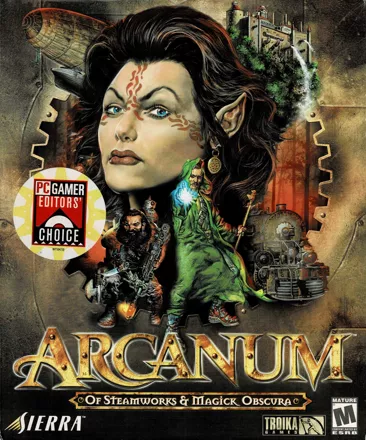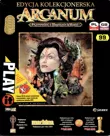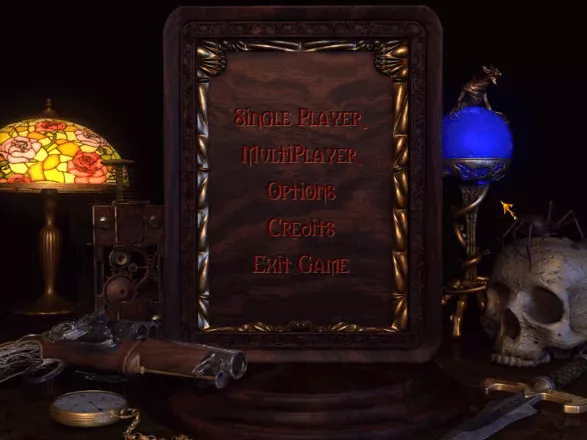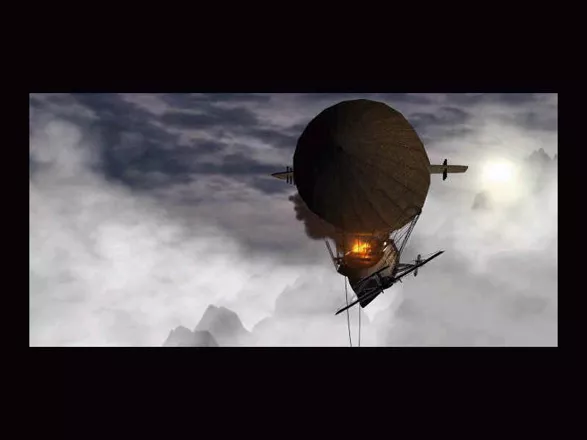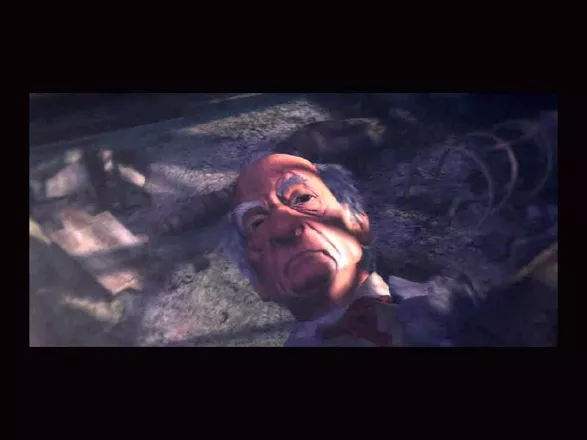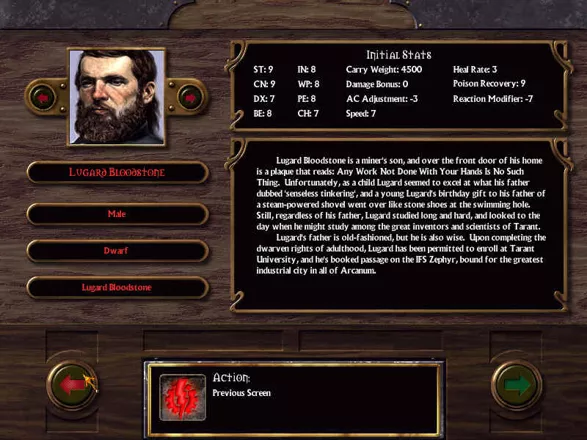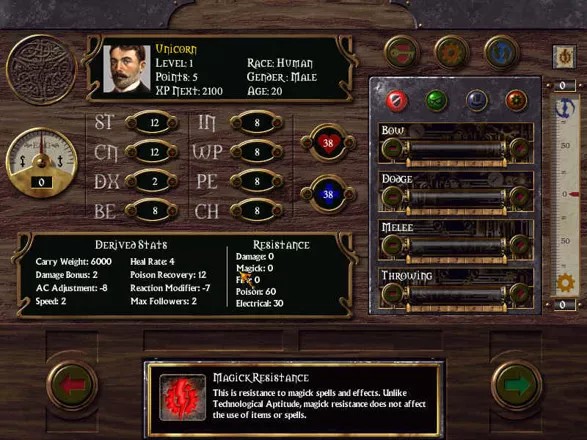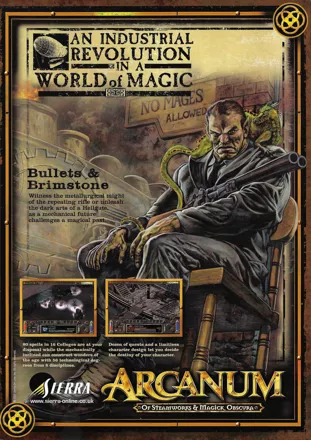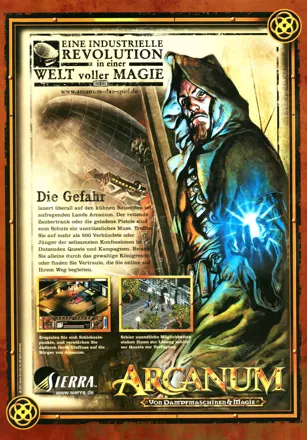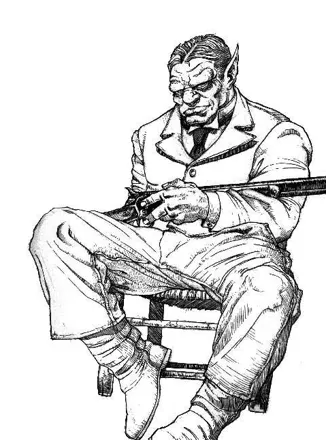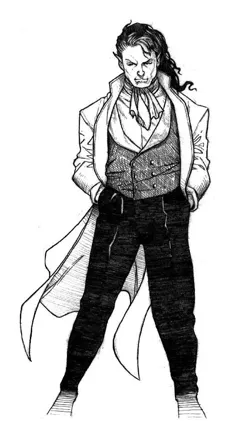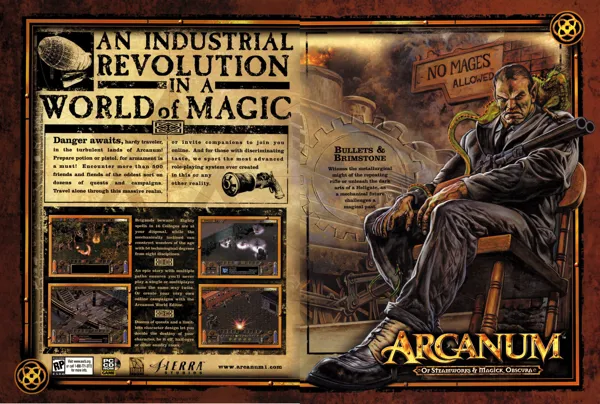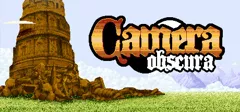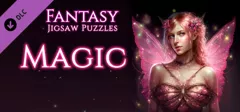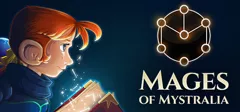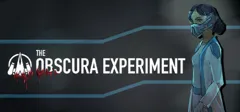Arcanum: Of Steamworks & Magick Obscura
Description official descriptions
The luxury zeppelin IFS Zephyr begins her maiden voyage from Caladon in the Kingdom of Arland to Tarant, one of the largest cities in the technologically advanced Unified Kingdom. Suddenly, while the zeppelin is cruising over mountains, two monoplanes attack it and eventually shoot it down. The two half-ogre attackers die in flames along with all their victims except two who miraculously survived. However, one of them, an old gnome, is mortally wounded. Just before he dies, he gives a silver ring to the other survivor and tells him to "find the boy". The witness of the crash, a man named Virgil, declares that the now only survivor is "The Living One", a reincarnation of a deity, and offers to follow him wherever he goes. The hero begins a long and perilous search for the mysterious boy, the origins of the silver ring, and the unknown enemy who was behind the attack on the zeppelin.
Arcanum is a role-playing game similar in concept and many gameplay principles to Fallout. It is set in a unique world, which can be described as mixture between Tolkienesque fantasy, steampunk technology and elements of British and North American culture of the 19th century: dwarves may carry molotov cocktails, and a half-orc protagonist can travel by train between Victorian-like cities. Magic and technology are opposed to each other; most humans and dwarves embrace technology, while some elf clans stick to the old ways and consider scientific progress evil.
In the beginning of the game the player creates the main character, choosing from a variety of races, attributes, magical or technological disciplines, social skills, backgrounds, etc. When the character levels up, the player can increase his main parameters as well as any available skills. Like in Fallout games, the player directly controls only one character; however, companions who join the party may be given orders, and their inventory can be managed by the player.
The game is open-ended: the player is free to explore the vast world from the onset, undertaking a large amount of side quests or following the main story. Social interaction plays a significant role: depending on the player character's charisma and intelligence attributes, as well as persuasion skill, many problems can be solved in a non-violent way. The amount of companions willing to follow the protagonist also depends on the latter's charisma rating; companions may also leave the party if they disagree with the hero's behavior.
The player can select one of the three combat modes for the game: real-time, turn-based, and fast-paced turn-based. Turn-based mode is similar to the combat in Fallout games: characters require action points to move, attack, or cast spells.
The game includes an editor called WorldEdit, which allows players to create their own maps, campaigns, and non-playable characters. Objects from the base game can be carried across to the player-created scenario. The scenery editor allows players to create their own objects. It is also possible to set and change game variables, i.e. the amount of skill points required to perform a specific task.
Spellings
- 奥秘:技术与魔法 - Chinese spelling (simplified)
Groups +
- BestSeller Series (Cendant / Havas / Vivendi Universal) releases
- Fantasy creatures: Dwarves
- Fantasy creatures: Elves
- Fantasy creatures: Gnomes
- Fantasy creatures: Halflings / Hobbits
- Fantasy creatures: Orcs
- Gameplay feature: Alchemy
- Gameplay feature: Brothels
- Gameplay feature: Character development - Skill distribution
- Gameplay feature: Gambling
- Gameplay feature: Karma meter
- Gameplay feature: Multiple endings
- Middleware: Bink Video
- Physical Bonus Content: World Map
- Protagonist: Female (option)
- Sound engine: AIL/Miles Sound System
Screenshots
Promos
Videos
Add Trailer or Gameplay Video +1 point
See any errors or missing info for this game?
You can submit a correction, contribute trivia, add to a game group, add a related site or alternate title.
Credits (Windows version)
157 People (118 developers, 39 thanks) · View all
| Project Leader | |
| Lead Programming | |
| Programming | |
| Design | |
| Animation | |
| [ full credits ] | |
Reviews
Critics
Average score: 79% (based on 61 ratings)
Players
Average score: 4.0 out of 5 (based on 168 ratings with 13 reviews)
An Enriching Yet Ultimately Flawed Experience
The Good
Let me preface this review by admitting that my relationship with Arcanum is... strained. It has taken me multiple attempts at playing the game over a period of nearly seven years finally to muster up the will to play the game to its conclusion. Perhaps this difficulty stems from a case of excessively impossible expectations on my part. Ever since I first read a preview of the game in late 2000, I had incredibly high hopes for the first CRPG by (the now defunct) Troika. After all, Troika was founded by the creative masterminds behind Fallout, perhaps my favorite game of all time, and the company's maiden voyage into the realm of PC role-playing seemed destined for greatness. It promised all of the elements that had made Fallout such a legendary game: a uniquely interesting game world, an intuitive and deeply flexible “classless” character creation system, and tactical turn-based combat should my in-game actions necessitate armed conflict. Even after receiving my preordered copy in late 2001, I was still unable to play the game for a few months due to a lack of free time to commit to such a massive RPG. Nevertheless, I found myself glossing through the game's massive manual, elaborately envisioning what sort of character I was going to create when I finally got the chance to venture into the world of Arcanum. It was just short of borderline obsession with a game I had yet to install on my computer's hard drive.
Perhaps it was simply inevitable, then, that my actual experience with the game fell far beneath my lofty expectations. Regardless, there remains a definite conflict within me as to just exactly how I feel about Fallout's half-brother, and this review is partly my own attempt to reconcile that conflict. At its core, I find Arcanum to be a mind-boggling mix of ingenuity and mediocrity, a rather peculiar blend that manages simultaneously to please and to repulse the gaming palate. Out of respect for my younger self's initial optimism for this “unique” RPG (not to mention the requirements of the MobyGames review format), let's start with the appealing elements of the game.
There are certainly plenty of things that Arcanum does right. First and foremost, the game world – or at the very least its premise – is one of the more appealing and well-conceived settings in any RPG period. Like Fallout before it, the world of Arcanum is highly innovative: a steampunk setting based on the real-world circa 1885 mixed with Tolkienesque high fantasy, elves and all. It is a world of conflict (and what good setting isn't?), but this conflict is more ideological than anything else. Technology – Victorian-era devices such as the steam engine and the locomotive – has revolutionized the world, and the old order of feudal kingdoms, chivalrous knights, and eccentric wizards is giving way to what one in-game personality loosely refers to as “pistol-brandishing cowards.” Of course, the technological-magickal conflict has a physical element as well: the two forces do not mesh, causing direct conflict not only between the forces themselves, but also between their respective adherents. Powerful mages are denied passage on trains due to the possibility of malfunction, there is animosity between the magickal elves and the tech-minded dwarves, and healing magicks have little to no effect upon those who practice technology. Even if it is not implemented as well as it could have been, the ideas such as these behind Arcanum's setting stand as a testament to innovation in game design.
Also like Fallout, Arcanum possesses a deep and flexible character creation system. In fact, Arcanum's system is quite possibly the most in-depth and intricate system I've ever seen, providing an unprecedented amount of freedom for players to create the kind of character they want to play. Want to be the best fighter ever to walk the land of Arcanum? Build up your Strength, Dexterity, and Melee and Dodge skills. Aspire to be the greatest, most feared necromancer who ever lived? There is a bevy of spells to choose from. Simply wish to dabble a bit in both roads to power so as to maximize your ability to get rich? Balance your skill point distribution among select spell colleges and technological disciplines as you see fit. The number of combinations of skills and attributes – not to mention special character backgrounds that provide both a special benefit and a drawback – is ridiculously high. Of course, it would be easy to feel a bit overwhelmed by such a daunting number of options (more on that later), but to those who invest the time and effort, the character system is one of the best ever devised.
Of course, the most skillfully crafted settings and characters mean nothing without a compelling reason to explore them. Fortunately, Arcanum delivers in this area as well, starting players off with an intriguing action-filled beginning that provides a definite adventure hook. The zeppelin on which the player's character is riding is gunned down, and the only other survivor dies shortly after giving the character a mysterious ring and instructions to “find the boy.” The player is then informed by a bystander – a neophyte religious devotee – that he is the reincarnation of an ancient elven deity. Shortly thereafter, mysterious assassins begin targeting the player. The opening is a magnificent call to adventure, and despite its propensity for disappearing for extended periods of time, the main storyline is highly compelling. It touches on a number of robust issues, from the costs of technology and resource usage, to race relations, to the philosophical implications of death and banishment. Though several key plot points are eventually dropped or forgotten, there can be no denying that the tale woven by the designers is if nothing else a wonderfully fitting excuse to explore and adventure in a strange new world.
The Bad
Though the creative elements of Arcanum are mostly praiseworthy, the technical elements (i.e. the gameplay) leave a terrible aftertaste. For every ingenius design decision as far as setting, character flexibility, and so on, there is an equally bafflingly terrible decision in the implementation thereof. I'm not quite sure whether this is better described as Newton's third law of gaming or as Murphy's law of gaming, but the fact remains that there are just as many (if not more) things that Arcanum does wrong as it does right.
For starters, the combat system in Arcanum just plain sucks. Why the designers of Fallout, which had one of the best RPG combat systems ever, were unable to implement something better than this is beyond me. The biggest contributor to this lackluster gameplay element is the fact that combat can be run in either turn-based or real-time mode, as Sierra insisted that the game not be solely turn-based for marketing reasons. On the surface, this appears to be yet another way of providing choice to the player, but such a choice is ultimately deceiving. Instead of being tactically sound like Fallout's or strangely addictive like Diablo's, Arcanum's combat systems are horrible shadows of the ones in those games. Combat becomes tedious, ridiculously easy, and flat-out pointless very quickly, as enemies seldom do anything other than charge into melee with the character. This battle conundrum is certainly due to the fact that it is difficult enough to balance a single combat system; trying to balance two separate ones within the same title is a near impossibility.
This lack of balance is without a doubt the game's biggest issue, not only in combat but in all aspects of the design. A lot of this problem comes from the designers' sheer ambition in providing unprecedented freedom in character development. There are so many things to choose from that it's simply impossible for all of them to be equally useful and/or represented in the game world. Some skills are useful maybe once in the entire game, while others (such as Melee and Dodge) are practically indispensable. In fact, pure melee characters have an almost ridiculously easy time with their adventure in Arcanum, due to the fact that experience is gained not for defeating an enemy, but rather for each successful attack. Melee characters thus level up at an alarmingly fast rate, and therefore obviously have a distinct advantage – a fact that even the game's manual is quick to admit. Other character types have a much more difficult time of things. “Hybrid” characters? Forget about it. Sure, they CAN be played, but the game is so ridiculously unbalanced against them that it's not advisable. Such is the double-edged sword nature of open-ended “free” game design, I suppose.
There is, however, ample evidence of a lack of polish and sufficient care in crafting the game that leads me to believe that there were certainly just plain bad decisions made in the game's design. Many gamers have often cited the outrageous number of bugs – not only in Arcanum, but in every game that Troika ever made – as a major drawback. There are definitely quite a few annoying bugs; I had issues with a random memory leak that slowed animations to a near crawl, as well as the fact that the game would fail to reset my display's brightness upon exiting the program, leaving my desktop a strangely luminescent white color until I manually went back in and reset it. There was nothing game crippling, but the bugs were annoying nonetheless.
The bugs, however, are minor compared to the overall lack of quality control that plagues Arcanum. Aside from the usual underdeveloped areas, quests, and NPCs (especially late in the game), there are many things that happen in gameplay that simply don't make any sense. For example, right before confronting the Schuylers about their dealings, I recruited the dwarven tech specialist, Magnus, who also had a beef with them. Without spoiling anything, I will simply say that Magnus and I decided to put an end to them, and emerged victorious in combat. Magnus thanked me for siding with him and permanently joined my party. Months of game time later, however, I asked Magnus to wait for me for a few minutes while I took care of a minor quest in one of the game's towns. When I asked him to rejoin me less than five minutes of real time later, he angrily refused. “Wait a minute,” he exclaimed, “you've been off making friendly with those Schuylers behind my back, haven't ye?” Umm, no Magnus, we killed them about nine months ago in game time, remember? Weird scripting errors like this one litter the game world. Characters remind me of things that we never talked about previously, I am given dialogue options detailing things that have never been mentioned in the game, and so on. While a few instances of this sort of thing are to be expected in any game of this magnitude, the sheer number of such errors in Arcanum falls just short of offensive.
The Bottom Line
I'm still not quite sure what to think about Arcanum. On the one hand, it's extremely appealing and outstanding; on the other, it's maddeningly inconsistent, poorly actualized, and sadly mediocre. Perhaps the best way for me to sum up Arcanum is as an ambitious failure, a flawed experience that is nevertheless appealing. I have made no secret of my mixed feelings toward this once-promising game, but after seven years and numerous playthrough attempts, I can finally say that this game has been an overall positive experience for me. This game certainly doesn't hold a candle to the upper echelon of CRPGs like Fallout or Planescape: Torment. Due to its incredibly unique and immersive world, though, it is still worth experiencing and enjoying – if its faults can be overlooked, that is. If you admire it for what it's trying to do and what it represents instead of what it ends up doing a lot of the time, you will find that it's a gem of an RPG, albeit an unpolished one.
Windows · by prymusferal (23) · 2008
Voi ch'entrate lasciate ogni speranza (Dante, but not the one met in Ashbury)
The Good
You WANT to play this game. It's Fallout garbed in Wild Wild West and
Dungeons and Dragons finery, with scents of Ultima VII. You want to play
until you have figured
the use of all those trinkets, filaments, metal shavings, sprockets,
watch mechanisms, and so on, and so on. Until you have built something
out of a broken flintlock pistol and a small tube (answer: a working
flintlock pistol). Until you have pieced together the fascinating
story of this engaging parallel world. Perhaps I have explored as much as
one hundredth of
the world of Arcanum, perhaps as little as a thousandth.
I want to see more, to explore it all.
Most likely, I never will. Why?
The Bad
It started gradually, my annoyance growing slowly, slowly. Little, tiny
wee pieces of aggravation which I was all too willing to put up with, so
eager I was to play on. Then it exploded like a soap bubble. Joachim's
trail of notes told us, Virgil and me, to go next to Stillwater.
Oh, we'd come across a mention of Ashbury too, but Stillwater seemed the
logical next stop. No Stillwater, no Ashbury on the World Map when
we consulted it, though. So we decided to board the train in
Tarant. As I went to buy tickets at the booth, my mouse pointer
turned into a sword. Wot? Combat mode? What had I done to deserve
that? I quit, reloaded, and was careful to watch my step this time. Combat
mode again?! Was it something I'd eaten? (too much garlic, maybe?).
After a few reloads, Virgil and I just decided to walk to Black Root
and board the train from there. All went well. So the Tarant incident
must have been a bug. But... wot? Stillwater was not on the time
table, but Ashbury was. So we rode to Ashbury, which then, and only
then, showed up on the map. We really had no interest at all in
fixing their problem with the ghouls, zombies, and assorted undead
in their cemetery, and Dante, who had eagerly joined us, seemed such
a shady necromancer type that we quit again, and reloaded. That is
when the bubble burst.
The bugs, the inept combat, the needle-in-a-haystack errands, everything.
The bugs. I just mentioned one. Another is during combat, when your followers, or the beasties, appear to go into an infinite loop, leaving you there, waiting for your turn, forever and beyond. And then, the odd screen freezing solid, but we're used to that.
The inept combat. The blurb on the game box is a farce. Don't you believe a word of it. The so-called turned-based combat allows you no tactics. In Fallout, like in X-COM Enemy Unknown, you know in advance the cost of moving here or there, and how many movement points you will have left for an attack. In Fallout, for every weapon you had, you knew the cost of using it, so many movement points for a shot of the sniper rifle, so many for the Desert Eagle pistol, so many for the sledgehammer, and so on. Nothing of the kind here. You just now how many movement points you have and the "speed" of your weapon, whatever that is. But you never know how many moves away you are from your target, how long it takes you to reload... why, as far as I could figure out, there was no reloading time, so that the only difference between a one-shot flintlock and a six-shot revolver was only damage and range. This is grotesque. Reloading a flintlock must have taken 30 seconds in real life. Shooting the next round of a single-action revolver? Cock the hammer, pull the trigger. A split second. Now all those things were nicely taken care of in Fallout. Here? Nothing. Combat has become a mindless brawl, a sorry farce. And I am cutting it short. I could rave on for two pages and more, count your blessings.
Next, the maps. Everytime you enter a town you can bring up a local map of it. The map is unrealistic and useless, because there is no "fog of war" so that the parts you have not explored are just as clear to see as those you have, and, typically, you never know whether you've already been here, or there, or if it remains to be explored. There is worse. If you have strolled along, oh, say, Devonshire Way in Tarant, and looked at the number plates of the houses there, they will show as question marks in the map, and, hovering your mouse pointer over them, the addresses will be revealed (good)... but not all places so observed will show with a queriable question mark (bad, very bad). Try that in Black Root especially. Some of the locations will have been recorded on the map, most not. This is particularly infuriating when, having found Sarah Boone in Dernholm, solved her problem in Tarant, and hoofed it back to Dernholm to tell her the good news... you have forgotten where she lived, and you have to visit every single godforsaken shack in godforsaken Dernholm to find her again (no-one you meet knows about her). Your journal is completely, utterly useless there. Why, you can't even jot down your own blog in it (remember Ultima Underworld?).
So Virgil and I resolved to download the two patches (5.4M in all), in the fond hope that they would make the game playable at last. We had learnt our lesson, too, namely, that if you take on many quests (errands, rather) you soon become lost. Er... yes... we got Colonel Eric von Stroheim's silver dentures from the Dark Elven Ruins, but where does he live again? With a great deal of luck your Journal has it: 36 Alexandrov Prospect. But in what city? Tough luck. You should have made a note of it on good old real paper with a good old modern real ballpoint pen. Imagine: all those technological gadgets in Arcanum, and they didn't even think of inventing the PIP Boy! Or at least, some proper paper and a proper goose quill, to keep with the Victorian England retro style.
So Virgil and I started all over again, from scratch, swearing never to take on a new quest until we had solved the current one.
And thus we came to the Mayor of Black Root, burdened as we were with the task of convincing him to pay his back taxes to the King of Cumbria in Dernholm. The mayor asked us to find his ceremonial dagger, his symbol of office, stolen by thieves "on the outskirts of town". We searched the outskirts of Black Root high and low, left, right and centre, east, west, south and north, to no avail. We interrogated every single living soul in Black Root. Not a clue. We downloaded a walkthrough, which said: follow the path leading out west of town, eventually you will find the thieves' camp. We did follow the path, and beyond, when the path petered out. Nothing. We trekked back and forth, forth and back, south and north, north and south, west of Black Root. In vain. And no wonder, a screenful covers an area of about 20 metres by 30, and after trudging 20 screens worth at least, you still find yourselves only a pixel away from your point of departure on the world map. We switched to the world map view, picked a point a longish way due west of Black Root, clicked "Go". Never a whiff of a thieves' camp.
Navigating the local maps is an infuriating business. Want to go from Madame Tussaude's to Delores Boston's place to deliver a crystal ball? Theoretically, you scroll the map, mark way points by clicking, then click the "Go" button and there you... go. First, why do you need intermediate points? Why can't you just click on your destination and be done with it? Second, you often get this hair-tearing message: "your path is blocked" when, in fact, the two points are within plain view of each other, without a single obstacle in between. Third, sometimes, you just don't make it there because a wandering pedestrian has chanced into your path, and the AI is too stupid to have you walk around him. You have to take over and do it yourself.
A similar "path blocked" message often flashes on the world map when trekking from one city to another, even though there is nothing in the way of your destination. You just have to find another way point, not "blocked", a few pixels away.
And the world map is bogus. I talked Virgil into taking a break on our way to Black Root to take a look at the bridge over the river (what's its name? No names for those rivers on the world map). I was expecting a breath-taking view of a feat of Victorian engineering. I clicked on a point carefully picked slap bang in the middle of the picture of the bridge... go! When we got there, lo and behold... no bridge, no river. Just grass. We went in ever widening circles looking for the bridge. We didn't even find the river. But just try clicking your first way point on the west side of that non-existent river, the second on its east side... "path blocked". To get through, your two way points must straddle the bridge exactly. Ridiculous.
The Bottom Line
1. Combat is a brainless, preposterous farce. Don't put up
with it: find a character editor and pump up your and
your followers' strength and dexterity right up to the
maximum.
-
Don't rely on your "journal", keep your own, either on physical paper using a physical pen, or repeatedly hitting Alt-Tab to access your favourite word processor (mine is NoteTab).
-
Be prepared to be frustrated.
Windows · by Jacques Guy (52) · 2004
An engrossing and impressive rpg that ultimately lives up to it's potential.
The Good
There's a lot to love about Arcanum, it's the first rpg to come out from the runaway splinter group of Fallout's developing team, and suffice to say that the pedigree shows.
The game provides a truly engrossing experience, in a completely unconventional setting, with lots of rpg-ing goodness and a wonderful character editing system.
Truly the game's strongest point is it's world, it's a mixture of traditional fantasy elements with a strong "steampunk" edge that makes for an incredibly unique gameworld (sort of like "Thief meets The Difference Engine"). A gameworld that is populated to the max with npcs, quests, and places to explore. This of course takes the focus off the main plot, but as long as you understand that, that half the fun in Arcanum comes from exploring and fooling around at your leisure, then you'll be okay. Arcanum appeals to those types of players that want to experience a game from end to end, not just 1 (one) adventure in 1 (one) setting. If you want everything tied up nicely with the main plot then you are barking at the wrong three. The game has millions of sidequests that both enrich and liven up the experience (if you are willing to put the storyline in the back-burner for a while) in fact, few games take you off the main plot to explore an X-files like conspiracy or have you solve murder cases, negotiate political treaties, or lots of impressive quests like the exceptional one with the fortune teller early on....Granted, the game has a bit of "filler" material, but it's nothing compared to the amount of innovative and truly interesting quests it has in store. And the story itself even though is starts out rather bland, gets way better as the game progresses, with a lot of good twists and situations.
The npcs that can be added to your party come in a nice variety, and add a lot of color to the game, they add info and comments on locations and have their background, motivations and will add their own participation to the storyline. Only a select few have this however (tip: choose the talking ones! ;)) and they don't add as much color as in other games like Baldur's Gate, but they bring a lot more to the game than more inventory space and fighting muscle. Whoever says they are merely packhorses hasn't taken Magnus around, or left Virgil early on in the game, didn't take Z'an A'zul Rhin (or whatever!!) to Arronax, left Raven to rot in Quintarra, or didn't even bother to check Torian, etc...
Another highlight of the game is it's powerful character editing system... Which again, will piss off players that have little grasp of what they want. I'm not calling myself an expert in this types of games, but I have seen newbie rpg friends stare blankly at the screen trying to figure where to put their skill points. One must certainly know what he wants when he creates his character, and must be prepared to steer him in the direction that matches his playing style. As in other skill-based rpgs like the Fallout games, the character evolves continuously, and is not limited by a particular class. However the character system in Arcanum goes a step further and in some aspects even surpasses Fallout's S.P.E.C.I.A.L. system. For starters it's based on points, which as even the remaining Black Isle developers admitted, works a hell of a lot better than Fallout's percentage system. You could sometimes add 15% to a skill and nothing tangible would happen, you always had to raise the percentages above certain "milestones" to get stuff to happen (say, 50, 70, 100, 150, etc.). On Arcanum you get a small number of points to add to any skill, but said points ALWAYS make a difference, so needless to say there's a great feeling of reward for every point earned, not to mention that you have considerable bonuses for excelling on each skill like being able to buy worn items, get any npc in your party regardless of alignment, etc.
Furthermore, the game allows you to put points into your basic skills, which is to me, another great choice. The lack of that option in the Fallout games placed you in a shell you had no chance of getting off in the game, once you assigned your points, it remained forever etched in stone for the rest of the game... effectively thrusting you in a class of sorts, a class made by you, but a class in the end. Sure, this system only works if you like this kind of freedom, but even if you don't Arcanum comes with lots of pre-made characters, and an auto-level up scheme which simplifies the whole process.
On the technical side of things, the game comes with a great soundtrack and good sfx. The graphics are dull at times, but they are functional enough. Oh, and for the millions of geeks that keep bugging about the lack of a decent viewing area, I should mention that my copy came with a big Arcanum FULL SCREEN start icon... I suggest you guys try it!
Oh, and you also get a multiplayer mode, an editor, and the chance to play mods! How's that for more player value?
The Bad
For starters there's the fact that the game has serious performance issues. I am well above the recommended system requirements and even so I experienced stuttering, and choppy animations... next time add some 3D stuff guys, if only to take advantage of hardware acceleration...
Also the cutscenes in the game are exceptionally well made, but are veeeery scarce. In fact, there isn't a real ending movie, and there isn't a proper epilogue to your adventure, just a rundown of how you affected each location and character in the world, which is a nice touch... but it's not an ending sequence!!!
Other than that there's the issue of fights and experience earning. The fight system is rather good, it offers a significant amount of options without becoming cumbersome and allows for an interesting set of options, I for one think the addition of a fatigue system works great, since it forces you to keep an eye on what your choices are. Unfortunately you have little to no control of your party members in combat, you can order them to stop or start attacking, but that's about it. Mind you, they work a hell of a lot better than in the Fallout games (whoever says he didn't cross his fingers and clench his teeth whenever any party member whipped-out a smg or minigun is lying his ass off!) but they still have weird quirks. The weapon selection is always weird ("ok Virgil, so you are telling me that Broadsword you can't even handle is better for you even when I'm giving you a filament sword??") and the AI on both opponents and allies is questionable at best. Your friends will take the most weird and stupid routes to get to their enemies, and they will make use of their most powerful spells in completely absurd situations. Ditto the enemies, whom most of the times I just tricked into targeting and following me (keeping out of his reach), while the rest of my party kicked his ass to his seemingly complete ignorance.
Regarding the exp. issue, the game has adopted a weird system. You get experience when you kill monsters, but also when you hit them!! Needless to say, you get very strong, very fast, and while in a decent town you will probably level up once due to the quests, in a typical dungeon you'll go 3 levels up minimum!
It sure is nice to feel that you are always moving forward, but your character does get VERY strong VERY fast, especially if you do the altar quests. Memo for Arcanum 2: Fix up the exp. balancing.
The Bottom Line
A truly unique rpg that stands on its own, and even surpasses it's predecessors in some accounts. An interesting question was risen in a previous review, does Arcanum have a meaning? Yes it does, but not in the "You have to go and do this" kinda way. Arcanum's meaning is "You just got dropped on Arcanum. Enjoy yourself" :)
Completely engrossing and fulfilling, Arcanum is truly a landmark in the genre of crpgs, a game that sucks you in, and gets you lost in a brilliantly crafted world.
Windows · by Zovni (10504) · 2006
Discussion
| Subject | By | Date |
|---|---|---|
| [false alarm] glitch: no speech? | Rola (8483) | Oct 20, 2018 |
Trivia
Graveyards
A hidden graveyard, containing tombstones of Arcanum's most diehard fans, can be found at the location W: 1060 S : 809 on the world map. Another graveyard has lots of humorous epitaphs written on the graves. However, many of them are taken directly from Baldur's Gate.
Manual
Following on the tradition started in the Fallout manuals, Arcanum's manual includes an actual cooking recipe. This time it's Grandma Cookhill's Three Bowl Bread.
Mod pack
On 7 January 2002, the development team released a free mod pack, containing six new and exclusive adventures. It can be downloaded here.
Mods
Chris Beddoes has produced a mod for this game that addresses some balance issues, makes it overall a little more challenging, and replaces the entire opening area and quests. This latter is important because the opening area was used in the demo, and many players have just seen it too many times to want to start a new character any more, despite the near-infinite possibilities for character design. It can be found here.
References
- There's a location in the game called the "Isle of Despair" which is a penal colony which holds it's inmates in a remote island behind a magical barrier that makes it impossible to escape. Now, when asking the generic NPCs for its location, they answer:
"You mean the Black Isle? I'm not quite sure..."
Black Isle Studios is the name of Interplay's RPG division, and the former home of Arcanum's development team.
- A portion of the Stillwater giant quest contains a major (and fairly obvious) reference to Monty Python and the Holy Grail, specifically the part where you have to trace the beast to a cave and capture it. In fact, the whole sequence plays just like in the movie, you follow some giant footprints, enter a dark cave filled with bones and dead bodies, and so on.
- There's a Fallout reference in the walled city of Tulla. Apparently one of the students had to venture out in the Wastes to find a Water Gem. He has since returned and the Mages fear how the journey changed him and the influence he might have on other students. Plus, he's wearing mechanized armor.
- There's actually a reference to Bill Gates and Microsoft stealing the ideas for their Windows operating system from Apple's MacOS. One of the most influential and wealthy of people in Tarant is Gilbert Bates (Swap the G and B in Gill Bates and you have Bill Gates) because he brought the power of the steam engine to mankind. Another steam engine developer, called Cedric APPLEby is spiteful of Bates's success and claims that he invented the steam engine first and that Bates had stolen the idea off him.
Server shutdown
The official online servers were shut down on 1 November 2008.
Soundtrack
The soundtrack to Arcanum was composed by Ben Houge for string quartet and was provided in its entirety on Computer Gaming World's May 2001 demo CD.
Both the soundtrack and its sheet music are available as a free download.
Stillwater giant
Despite the result of the associated quest, the Stillwater giant DOES exist. It can be found on a random encounter between Stillwater and the pass to the elven city.
Information also contributed by Rambutaan, Sciere, Terrence Bosky, uclafalcon, Unicorn Lynx, weregamer, Wojit and Zovni
Analytics
Upgrade to MobyPro to view research rankings!
Related Sites +
-
Arcanum Walkthrough by Quandary
by Steve Metzler -
Developer's Site
Troika's Arcanum page -
Hints for Arcanum
Having trouble with Arcanum? These hints are arranged in question and answer form to help you solve it on your own. Includes complete solutions. -
Mike's Arcanum Resources
A really good Arcanum fan site with many things you can't find elsewhere. -
Official Arcanum Website
The Official Sierra: Arcanum Website (English) -
Official website (german)
Official website (german) -
Sierra: Arcanum - Soundtracks
The Arcanum soundtrack is officially available for download here! -
Terra Arcanum
Wonderful fansite with walkthrough and good gameplay hints.
Identifiers +
Contribute
Are you familiar with this game? Help document and preserve this entry in video game history! If your contribution is approved, you will earn points and be credited as a contributor.
Contributors to this Entry
Game added by Unicorn Lynx.
Additional contributors: Zovni, Kaliban, Indra was here, Jeanne, phlux, JRK, tbuteler, jsbrigo, Alaedrain, Patrick Bregger, Plok.
Game added August 25, 2001. Last modified April 5, 2024.
